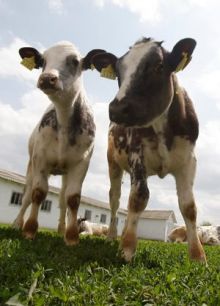The government set such high standards for agrarians back in 2007, having included a list of relevant requirements in the program of Ukraine’s rural development until year 2015.
The principles of organic farming are quite simple: tilling the surface soil no deeper than five centimeters, without using any chemical fertilizers, pesticides, or synthetic medicines. Only natural remedies should be used for pest control and disease prevention, such as garlic extract, and only organic fertilizers should be employed. Crops should be free from genetic intervention, hormones, growth regulators, chemically synthesized fertilizers, and plant protection products.
Organic farming technology is nothing new for Ukraine. Back in 1976 the then Ordzhonikidze collective farm (now the private enterprise Agro Ecology) in Poltava oblast became the experimental site for the study of accelerated development and implementation of soil conservation farming systems. In addition to being environmentally friendly, such technologies allowed for the production of better, healthier, and tastier produce.
Recently the journalists of leading Ukrainian media visited Agro Ecology within the framework of a press tour, organized by the State Agency for Land Resources of Ukraine and the World Bank. Semen Antonets, Hero of Ukraine and founder of the abovementioned farm, spoke about the peculiarities of organic farming in Ukraine and the major problems farmers expect state to solve.
Antonets has long headed the farm in Shyshaky raion near Poltava. His farm has been producing organic food for more than 30 years now. The enterprise leases 6.5 thousand hectares of land, and cultivates another 1.5 thousand that belong to petty farmers. At present Agro Ecology employs more than 500 workers. Besides, a branch of the Poltava State Agrarian Academy is open in the nearby village of Mykhailyky, where agronomy students undertake their on-the-job training.
Agro Ecology does not employ pesticides, herbicides, and other chemicals. Instead, they have developed an original system of pest control (including weeds, diseases, and vermin) based on the use of implements, correct timing, and the selection of crops in rotation. The farm has long given up the plow, which emaciates and ruins humus. The tilling implements used here include cultivators and harrows. The conventional cultivator was improved to make it more efficient in the field.
The only fertilizer used here is manure. The use of various plant species allows the farmers to improve and enrich the soil with nutrients. Thus, such perennials as sainfoin and alfalfa are extensively used for soil enrichment, while a certain proportion of plow land is used as sidereal fallow.
On top of that, Agro Ecology keeps a herd of over 5,000 cattle, nearly 2,000 of which are dairy type. The daily yield is 25 to 30 tons of extra premium milk. The enterprise practices free-range cattle farming and uses only organic, chemical-free fodders. The farms have up-to-date milking facilities, with special software to control the dairy cycle, allowing to monitor the quantity and quality of milk produced by each cow, so that animal technicians can adjust the housing conditions. This type of organic farming has another crucial function — that of providing organic fertilizers for the soil.
Sadly, however, this environmentally friendly approach has not yet brought any notable dividends to Ukrainian farmers. This is because the market for their produce is virtually negligible. “If we could launch a policy to create demand for organic dairy, meat, cereals, and other produce, to cater directly for the wide categories of customers, we could expand this kind of production. Meanwhile, the price for organic grain is the same as for the intensive farming produce,” says Antonets. “It appears that we still have no material incentives for environmentally friendly farming in Ukraine.”
Conversely, in Germany, Switzerland, and other European countries there is an extensive network of supermarkets selling exclusively organic produce, and the prices are quite affordable. In Ukraine one also can purchase genuine organic products, but at significantly higher prices. Thus milk and other dairy products, manufactured by the organic farm Byron Agro of Stovpiahy, Kyiv oblast, can be purchased online. You can order a product of your choice on a specialized website and even have it delivered (quite a luxury, by the way, at an average fee of 70 hryvnias in Kyiv. – Author).
The produce from Yurii Serheiev’s farm (founded in 2009), is way too pricey for his fellow villagers in Stovpiahy, 85 kilometers from Kyiv. Nor can an average resident of Kyiv afford Byron Agro cow’s milk (25 hryvnias a liter) or goat’s milk (100 hryvnias a liter). Meanwhile, the farmer cannot complain about a lack of customers. He says that they are mostly people of average means who are prepared to pay extra for good quality, especially when their kids are concerned. These are the customers who will fork out 40 hryvnias for 10 organic eggs or 80 hryvnias for a 200-gram pack of butter — and his produce is not even officially certified as organic.
“There have been attempts to enter into cooperation with a certain representative of Ukrainian retail network,” said Serheiev. “Yet they failed.” The major criteria which Byron Agro produce failed to meet, according to the owner, concerned shelf life and facilities.
At the same time, one can see quite a few foodstuffs on the shelves of Ukrainian supermarkets labeled “organic,” “eco,” or “bio.” Yet the primary products are of obscure origin, and the production technology used remains a trade secret. Due to a lack of legal regulation in the sphere of ecological labeling, foodstuff manufacturers have so far been able to independently determine the degree of ecological cleanliness of their produce. Hopefully, after the approval of the Law “On Organic Production” by the Verkhovna Rada on April 21, 2011, the situation will change for the better. The consumer will be sure that the label “eco” indicates a genuine organic product, and “environmentally friendly” farmers will be properly rewarded for their efforts.








